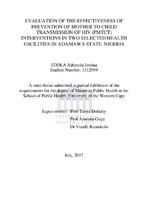| dc.contributor.advisor | Doherty, Tanya | |
| dc.contributor.author | Itiola, Ademola Joshua | |
| dc.date.accessioned | 2018-04-18T09:16:22Z | |
| dc.date.available | 2018-04-30T22:10:07Z | |
| dc.date.issued | 2017 | |
| dc.identifier.uri | http://hdl.handle.net/11394/5966 | |
| dc.description | Magister Public Health - MPH (Public Health) | |
| dc.description.abstract | Most (90%) Human Immunodeficiency Virus (HIV) positive children are
infected through mother to child transmission of HIV (MTCT). Without any interventions the
risk of MTCT is between 20% and 45% at the final endpoint of 18 - 24 months. Efficacy
studies have however proven that with antiretroviral interventions, MTCT risk can be
reduced to less than 2% or 5% in non-breastfeeding and breastfeeding populations
respectively. It is important to evaluate the effectiveness of Prevention of MTCT (PMTCT)
interventions in routine health facility settings where service delivery may not be optimal.
The current pool of evidence on PMTCT effectiveness in Sub-Saharan Africa is limited and
no PMTCT effectiveness study has been conducted in Adamawa State, Nigeria since the
programme started in 2007. | |
| dc.language.iso | en | |
| dc.publisher | University of the Western Cape | |
| dc.title | Evaluation of the effectiveness of prevention of mother to child transmission of HIV (PMTCT) Interventions in two selected health facilities in Adamawa State, Nigeria | |
| dc.rights.holder | University of the Western Cape | |

